What Covid crowd overhaul means for AFL, major events
Brett Sutton has revealed the components of attending footy at the MCG which may have to be altered before Victoria is ready to host major crowds again.
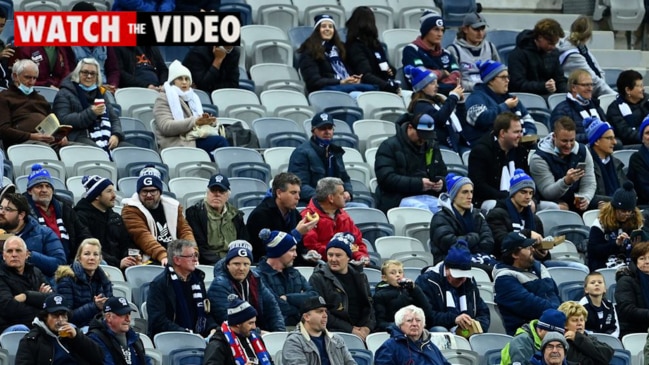
Coronavirus
Don't miss out on the headlines from Coronavirus. Followed categories will be added to My News.
Large crowds at AFL matches and other major events are under review amid concerns about the spread of Covid’s Delta strain at stadiums.
Health authorities are alarmed over “game changer” infections at AAMI Park, which hosted last Tuesday night’s Wallabies rugby match, and at the MCG on July 10.
There are concerns Delta’s spread cannot be limited by measures such as empty seats separating groups of spectators.
It is understood that authorities are also furious over crowd control at AAMI Park, which saw hundreds crammed together outside Gate 7 – where the virus is believed to have spread between fans.
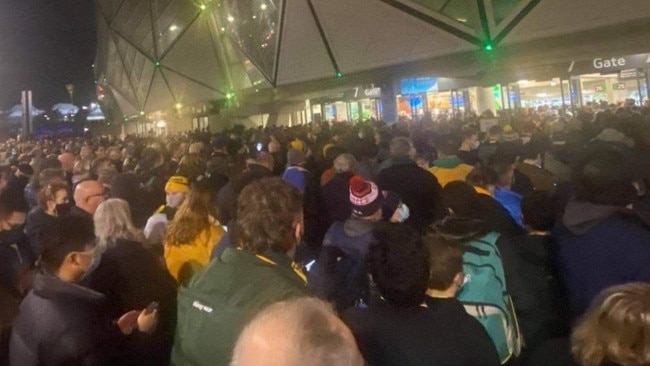
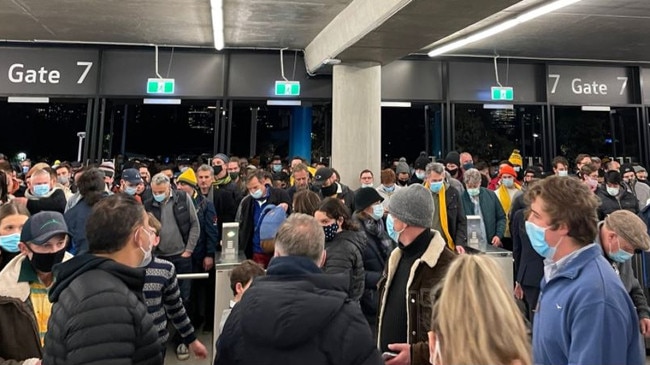
Stricter limits on spectators at events could significantly impact the remainder of the AFL season, including the Grand Final.
New entry requirements for events, including proof of either vaccination or a negative test are also being considered.
When asked about such an initiative, government and health officials told the Herald Sun “everything is on the table”. Sources said they would look at all measures to get crowds back in time for September’s Grand Final.
Tighter mask rules and restrictions on movement are also being considered.
“After we saw outbreaks that didn’t eventuate at the MCG and Marvel earlier this year, this week has come as a huge shock,” one source said.
Victoria’s Health Department allowed crowds, up to 85 per cent of capacity, to return to AFL matches earlier this year, believing empty seats between groups would prevent the initial Covid strain and its Kappa variant transmitting between fans.
But the current Delta outbreak, leaked from Sydney, has spread between multiple footy fans seated in different bays of the MCC Members’ Reserve, as well as rugby fans on different levels of AAMI Stadium.
It is feared the more infectious variant can spread through more fleeting contact as fans queue to enter grounds, buy drinks or even go to the bathroom.
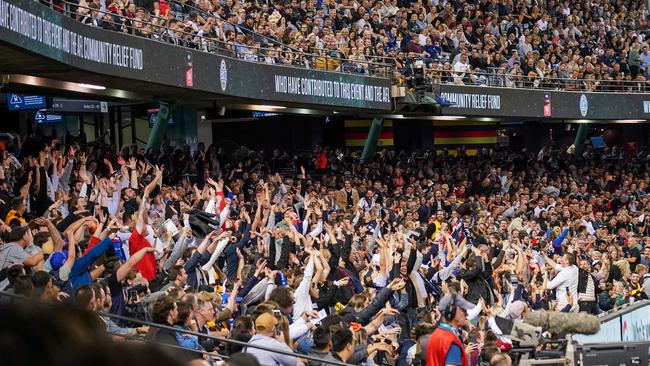

Chief health officer Brett Sutton said that while there was a much lower risk of outdoor transmission – such as outside at AAMI Park – “it happens and we have to really look at the public events framework and how we help manage that as we kick off public events down the track”.
“We have to reflect on the transmissions that happened at AAMI Park and the MCG and what that means going forward. It is really not about the total number,” he said.
Going forward, Prof Sutton said: “We have to reflect on the transmissions that happened at AAMI Park and the MCG and what that means going forward. It is really not about the total number.”
He added that the tens of thousands of people attending an event was “significant”.
“When we get up again, we’ll have hundreds of thousands of people visiting each other’s homes out in the community, visiting restaurants and various events, so the multiplying event there is significant,” Prof Sutton said.
“We need to be sure that the risk mitigation that we have in place across the state for all of the events and interactions is as strong as it possibly can be.
“For sporting events, that will be about compartmentalising people in zones very strongly so we can contact-trace a reasonable and manageable number within those zones.
“They have individual toilets, food stalls, and so on and so forth. The ingress and egress out of those gates. Staggering times potentially, having more open points of entry and exit, will be important.
“We will keep looking at it. I don’t know if that means that we can’t get to big crowds but we can’t guarantee anything yet.”
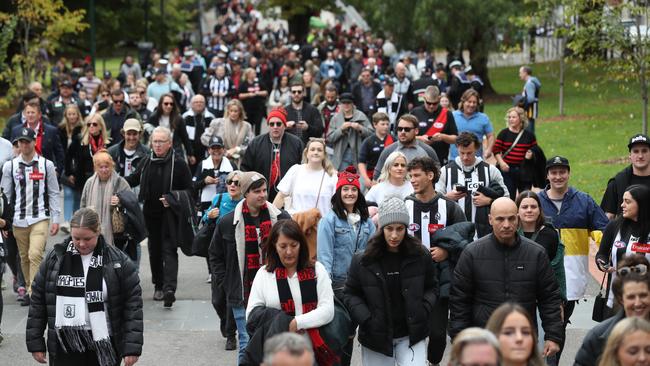
To avoid major “pinch point” entries like what was seen outside Aami Park last week, Prof Sutton said there was an opportunity, for example, to have a QR code symbol available for people to tap on or get scanning read across a much bigger geographical area.
“Like we have people checking in at domestic flights at the airport, rather than being in a big line,” he said.
“Those are some examples that I think can be applied. It is difficult to manage. Obviously people can’t be coming in over three to four hours before a game. It would need to be an efficient mode of entry.”
A spokesman for the Melbourne Cricket Club, which manages the MCG, said the organisation was “committed to protecting the ongoing wellbeing of those who visit the MCG and will continue to work with the Department of Health.”
AFL Fans Association president Cheryl Critchley said she supported the way the AFL and the MCG had dealt with the unfolding outbreak, including measures adopted to keep fans safe this season.
“We do support what the AFL is doing in terms of keeping the season on track, it is extremely difficult for them at the moment,” she said.
“There are some fans who think there should be a pause (on the season) at some point, but obviously the AFL is in a better place to decide when things reach that point.”
Health authorities are understood to be frustrated with AAMI Park management for allowing the large crowd to gather shoulder-to-shoulder as they entered the ground last Tuesday, with Gate 7 now listed as a Tier 1 exposure site.
A key condition of allowing crowds to return to events had been agreements with stadium management to avoid long queues or a build up of patrons.
The ease with which the Delta variant worked its way through the crowds has also forced Victoria’s Department of Health to change its definition of Tier 1 exposure sites, which will see many more people classed as primary close contacts. Rather than only classifying those near a case as close contacts, the threat of passing the virus while moving about could see full stadiums forced into isolation.
It has also emerged two men – who both spent a significant part of their infectious period in the community without symptoms – have been classified as “superspreaders”.
The men – colloquially referred to as “the man in his 60s” from the Ariele Apartment complex, and the “sports-loving” Trinity Grammar teacher – have gone on to infect 31 and 25 people, respectively.
Authorities believe the Trinity Grammar teacher contracted and then spread the virus within 36 hours – a time frame largely unheard of during earlier Victorian outbreaks.
It comes as a Covid-infected woman, who is part of the Barwon Heads cluster, called on the coastal community to “mask up” and become the “mask capital of Victoria”.
The woman, who the Herald Sun has decided not to name, took to a community Facebook page to warn of the seriousness of the virus.
“I would not have wished this on my worst enemy … such a fleeting contact has caused so much upheaval,” she said.
Thirteen new locally acquired cases were detected on Monday, but just one was in isolation throughout their infectious period.
They include a household contact of a Mildura man infected at the footy, four cases linked to Cremorne restaurant Ms Frankie, two connected to Trinity Grammar, and one case linked to each of the Phillip Island, Young & Jackson, Bacchus Marsh Grammar and AAMI Park match exposures.
The first case of a patron at the Euro 2020 finals event at The Crafty Squire was also confirmed.




